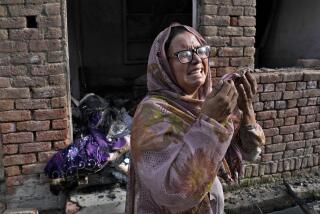Blasts kill 31 at busy Baghdad markets
BAGHDAD — A series of explosions Sunday apparently timed to strike Muslims preparing to break the Ramadan fast killed at least 31 people in Baghdad and injured dozens.
Also Sunday, members of Iraq’s Christian minority protested passage of a long-awaited election bill last week that does not guarantee minorities seats on provincial councils.
The violence and the protests showed the tensions that still exist in Iraq despite progress on security and political reconciliation. The blasts were particularly jarring because they came around sunset, when the markets are filled with people buying food for the evening meal that breaks their daylong fast during the holy month of Ramadan.
“We are innocent and peaceful people. Why are they targeting markets and shoppers?” asked Hidar Abdulhussein, who suffered a broken leg in a bombing at a market in west Baghdad.
“How were they able to get in? There are so many army and police checkpoints,” he said, referring to security forces around most major Baghdad marketplaces.
Police reported three blasts: the one in west Baghdad and two in the Karada district of east Baghdad. The death toll from the west Baghdad blast, caused by a minivan laden with explosives and parked near the market, was 11. The Karada explosions occurred an hour and a half later, about 7 p.m., in a popular shopping district. At least 20 people died there, and 72 were wounded.
Police said the first Karada blast appeared to have been caused by a suicide bomber wearing an explosives vest rather than by a roadside bomb as initially thought. Minutes after the blast, a car bomb exploded.
The damage could have been far worse. Police said they found an explosives vest that had not been detonated amid the carnage, a sign that a second suicide bomber had been deployed but backed out.
Several witnesses in Karada and at the west Baghdad bombing site expressed bewilderment that such attacks could have occurred when Iraqi security forces were heavily deployed. Extra forces are typical around Ramadan, which traditionally has seen an increase in attacks blamed on insurgents trying to stir up sectarian and political tensions.
The security presence has been extra high this weekend because of the upcoming Eid al-Fitr holiday, which marks the close of Ramadan and which parliament has declared will begin Tuesday and run through Sunday. Iraqis flock to markets to stock up on Eid gifts and food for special meals in the days before the celebration.
“I’m really sorry that [in] the days before Eid, we had three car bombs in like an hour,” said Firas Adil, a clothing vendor in Karada whose shop is near the bombing site. “I find it strange that the security forces are deployed heavily and such incidents happen.”
As pressure builds on the United States to withdraw its troops, more responsibility is falling on Iraqi security forces to protect crowded public places. That responsibility could grow if Baghdad succeeds in getting an agreement from Washington that would require American troops to withdraw from cities by June.
Under the arrangement being negotiated by U.S. and Iraqi officials, American forces would move into overseer roles on bases out of city centers, leaving Iraqi forces to handle the bulk of the job of protecting the citizenry.
Top U.S. commanders have warned against too quick of a pullback, however, fearing this could open the door to a resurgence of bloodshed if Iraqi forces are not prepared to take over the job.
In the northern province of Nineveh, thousands of Christians protested against the election bill’s lack of a provision to guarantee seats for minorities in provincial legislatures. Parliament passed the measure last week after months of bitter infighting. It calls for provincial elections to be held by Jan. 31.
Two protests took place in Nineveh: one in Qosh, about 35 miles north of the provincial capital of Mosul, and the other in Qaraqosh, about 15 miles east of Mosul.
“Our demands are to cancel this law and issue a law that would guarantee the rights of the minorities,” said George Isaac, a Christian leader who organized the Qosh protest.
Prime Minister Nouri Maliki added his voice to those expressing concern over the omission of minority quotas, issuing a statement that urged lawmakers to reconsider the matter for the sake of political reconciliation.
--
Special correspondents in Baghdad and Mosul contributed to this report.
More to Read
Sign up for Essential California
The most important California stories and recommendations in your inbox every morning.
You may occasionally receive promotional content from the Los Angeles Times.











